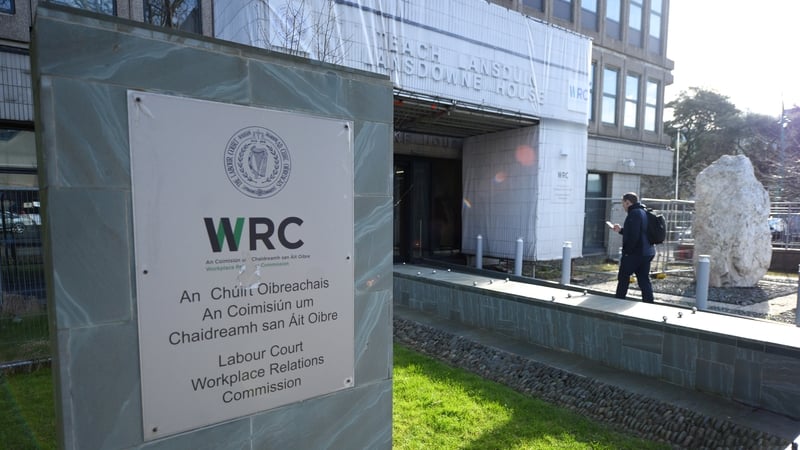Lawyers acting for a Dublin school say it and its principal “absolutely deny” a claim that it has attempted to “mislead” the Workplace Relations Commission (WRC) by handing in “false” versions of a guidance counsellor’s employment contracts.
The allegation was made during a preliminary hearing on Friday into a complaint under the Protection of Employees (Fixed-Term Work) Act 2003 by Mary Lynch (56) against secondary school St Dominic’s College on the Navan Road in Dublin 7.
Ms Lynch has accused the school, where she has worked part-time since 2021 on a succession of fixed-term contracts, of treating her less favourably than a permanently-employed comparator and attempting to avoid giving her a permanent contract by suppressing her hours and telling her it would not rehire her for the coming academic year.
The school has denied any breach, arguing Ms Lynch’s qualification as a guidance counsellor at third level means she is “not appropriately qualified” for work at a secondary school and that it is simply following Department of Education policy to favour qualified teachers.
At the opening of a tribunal hearing on Friday, human resources consultant Des Kavanagh, appearing for Ms Lynch, said he had an issue to raise about the contents of contract documents presented as an appendix to the legal submission provided on behalf of the school.
“There are questions about why we haven’t been provided with the signed contracts, but with alternative contracts, which are – I’m trying to choose my words carefully – false, misleading, I won’t use the word “forgeries”,” Mr Kavanagh said.
“Please don’t use that word,” said presiding adjudication officer Donal Moore.
“Why would the employer want to misrepresent themselves and mislead the WRC, and you, adjudication officer? I regard it as a very serious matter that someone decided to get some headed paper from the school and type up the contract they say Mary Lynch signed,” Mr Kavanagh continued.
“We now can produce the contract Mary Lynch signed, and there are significant differences,” he added.
Mark Curran BL, appearing instructed by Mason Hayes and Curran solicitors for the school, said any dispute regarding the contract would be a matter for evidence.

Mr Kavanagh, submitted that Ms Lynch signed her fourth successive fixed-term contract as a guidance counsellor at St Dominics last September, and had prior service with other schools in the area, and “should have already received a contract of indefinite duration (CID)”.
However, he said that when his client asked the principal of St Dominic’s, Ann Cameron, about a contract of indefinite duration, Ms Cameron replied that this would “never happen” and that she had been “advised by the Department of Education not to renew [Ms Lynch’s] contract”.
Mr Curran said this would be denied in evidence by Ms Cameron and said another school employee identified as a comparator by Mr Kavanagh was not appropriate, as that individual was qualified at second level and Ms Lynch was not.
Mr Curran referenced a Department of Education circular requiring any contract issued to an unqualified candidate to include “a condition that the contract will terminate on the recruitment of an appropriately qualified registered teacher or the following 31 August, whichever happens first”.
Mr Kavanagh said the school had presented a contract for 2021-22 academic year in its legal papers which was “said to be a contract that was signed by Ms Lynch and the principal”.
“Well, Ms Lynch signed a contract, we know it wasn’t that contract. Despite requesting it, she was never given a copy of the contract,” he said, adding that the respondent’s document was “false”.
“If it was a correct one, the Department will owe Ms Lynch six months’ pay,” Mr Kavanagh submitted, explaining that his client had only worked 11 hours a week that year, but that “someone who typed this up recently forgot that and put in the standard 22 hours”.
The 2022-2023 contract presented by the school was titled “appointment of a person for 2022 to 23 for a fixed-term [or] temporary position in an exceptional capacity”, referencing the relevant Department of Education circular, Mr Kavanagh said.
“The actual contract differs,” Mr Kavanagh said. “It makes no reference whatsoever to a person appointed for a fixed term temporary post in an exceptional capacity,” he said.
He said the “exceptional capacity” phrase was also absent from the 2023-24 contract, but that his client had “no issues” with the fourth contract issued for the 2024-25 academic year.
Responding, Mr Curran said that St Dominic’s College and its principal, Ms Cameron “absolutely deny any allegation of fraud”.
“There is no basis for that, and that will be vehemently defended in the course of any proceedings,” he said, adding that Mr Kavanagh had not given him a copy of the contract documents he had compared to the school’s appendices.
Mr Curran said there was “no practical difference” except for the absence of the wording around “exceptional” circumstances.
“Ms Cameron will give evidence that when [she] sent in the appointment form for Ms Lynch she was contacted by the Department and told the form she sent was incorrect,” he submitted.
“Because the contracts are templates, when Ms Cameron amended the 2025 contract, all the other contracts were amended as well – that’s why the contracts we’ve appended have different phrasing,” he added.
He called it a “simple clerical administrative error”.
“There is absolutely no reality to an allegation of fraud, and it is something my client takes extremely seriously,” he said.
“The employer retained copies of the contract that were signed. Why would they not have produced copies of the signed contract? They say they have the with them – there was nothing stopping them at the break,” Mr Kavanagh said. “It stinks to high heaven,” he added.
“That’s an outrageous comment,” Mr Curran said.
“We are going to adjourn,” Mr Moore said.
He gave the parties leave to make submissions on the “unexpected” contract issue, before closing the hearing. A new date is to be set in due course by the WRC’s schedulers.




